In celebration of Black History Month, we turn our attention to Dorothy Height, a remarkable civil rights activist and women’s rights champion. Height’s inspiring journey spanned decades of tireless advocacy, as she fought for social justice, equality, and women’s empowerment. Her profound impact on African-American history and her leadership in organizations such as the National Council of Negro Women have left a lasting legacy that continues to inspire and drive progress today.
Key Takeaways:
- Dorothy Height was a prominent civil rights activist and women’s rights advocate who dedicated her life to fighting for equality and social justice.
- Height served as the president of the National Council of Negro Women for an impressive 40 years and made significant contributions to advancing the rights of African American women.
- She overcame numerous challenges, including sexism and limited recognition, and built alliances with influential figures to further the civil rights movement.
- Height’s core values and principles centered around social justice, equality, empowerment, and intersectionality.
- Her legacy includes numerous awards and honors, including the Presidential Medal of Freedom, and continues to inspire future generations to continue the fight for equality.
Early Life and Education
Dorothy Height was born on March 24, 1912, in Richmond, Virginia. She later moved with her family to Rankin, Pennsylvania, where she attended racially integrated schools. It was during her time at Rankin High School that Height became socially and politically active, particularly in the anti-lynching movement. Her passion for racial integration and equality continued to shape her life and career.
After graduating from Rankin High School, Height pursued higher education at New York University. In 1932, she earned her undergraduate degree and went on to complete her master’s degree in educational psychology the following year. Height’s thirst for knowledge and desire to make a difference led her to pursue additional postgraduate work at Columbia University and the New York School of Social Work. These educational experiences provided Height with a strong foundation for her future activism and leadership roles.
The influence of Height’s early education and exposure to the realities of racial inequality fueled her determination to challenge the status quo and fight for justice. As she embarked on her journey, Height’s education would prove invaluable in addressing the systemic barriers faced by African Americans and women throughout society.
| Key Details | Achievements |
|---|---|
| Birthplace | Richmond, Virginia |
| Education |
|
| Focus | Racial integration and equality |
Dorothy Height’s Impact
Dorothy Height made a significant impact through her work with the YWCA and the National Council of Negro Women (NCNW). She played a crucial role in spearheading racial integration within the YWCA and served as the director of the Center for Racial Justice in 1965. Height actively participated in the civil rights movement and was considered a member of the “Big Six,” a group of influential leaders that included Martin Luther King Jr. and Roy Wilkins. She also organized Wednesdays in Mississippi, an initiative that brought together women from different racial backgrounds to work against segregation.
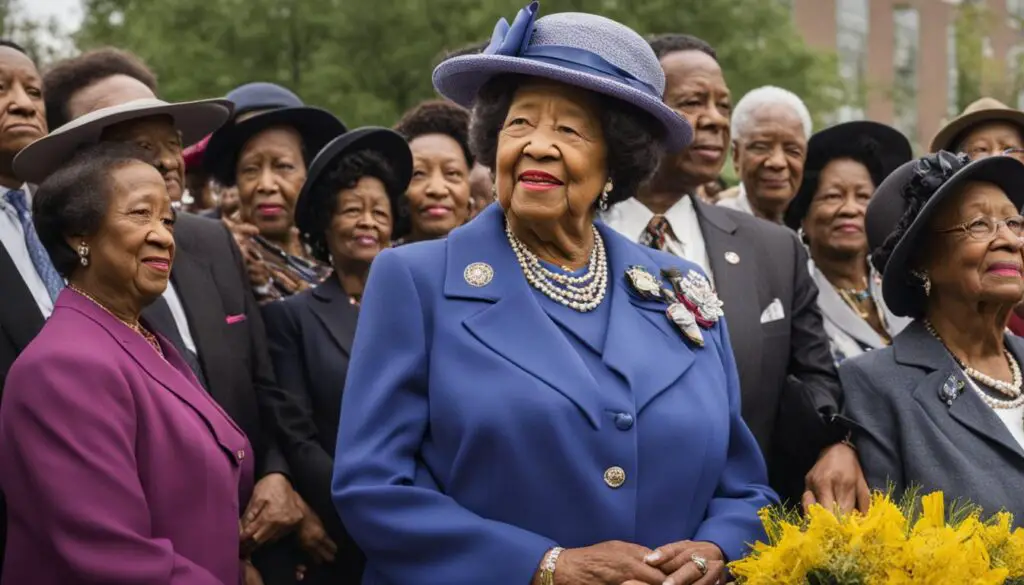
Height’s involvement with the YWCA paved the way for greater inclusivity and opened doors for African American women within the organization. Through her leadership, she addressed the challenges faced by minority women and advocated for equal opportunities. The Center for Racial Justice, under Height’s guidance, worked to combat discrimination and promote social justice. Her efforts in advancing racial integration and equality resonate even today.
Height’s work in the civil rights movement, as part of the Big Six, contributed to significant advancements in the fight against racial inequality. Her courage and determination were instrumental in organizing Wednesdays in Mississippi, which facilitated dialogue and understanding between women of different races during a tumultuous time in American history. Height’s commitment to breaking down barriers and fostering unity played a pivotal role in shaping the civil rights movement.
Overall, Dorothy Height’s impact on society, both through her involvement with organizations like the YWCA and the NCNW and her active participation in the civil rights movement, continues to inspire future generations. Her unwavering dedication to social justice and equality serves as a reminder of the power of collective action and the importance of fighting for a more inclusive and equitable society.
Height’s Leadership and Achievements
Dorothy Height’s exceptional leadership and numerous achievements solidified her role as a prominent figure in the fight for civil and women’s rights. She dedicated her life to advocating for equality and empowering African American women, making a lasting impact on society.
One of Height’s noteworthy leadership roles was her presidency of the National Council of Negro Women (NCNW) for an impressive 40 years, from 1957 to 1997. Through her tenure, she spearheaded initiatives and programs aimed at addressing the unique challenges faced by African American women and promoting social justice.
In addition to her work with the NCNW, Height served as the national president of Delta Sigma Theta Sorority, Inc. from 1947 to 1956. This role allowed her to play an influential part in advancing the rights and opportunities of African American women within the sorority and beyond.
Height’s inspiring leadership, dedication, and unwavering commitment to her mission have left an indelible mark on the civil rights movement and women’s empowerment. Her legacy continues to inspire individuals and organizations to advocate for equality and social justice, ensuring that her remarkable work will be remembered for generations to come.
| Leadership Roles | Years |
|---|---|
| National Council of Negro Women (NCNW) President | 1957-1997 |
| Delta Sigma Theta Sorority, Inc. National President | 1947-1956 |
“Leadership means keeping a vision in front of the people, affirming it over and over again, and making it a reality.” – Dorothy Height
Height’s leadership and achievements serve as a shining example of how one person’s determination and passion can spark significant change. Her legacy encourages us to embrace our capacity for leadership and take action in pursuit of equality and empowerment for all.
Overcoming Challenges and Building Alliances
Dorothy Height faced numerous challenges throughout her activism, but her determination and resilience allowed her to overcome them and forge important alliances. One of her notable collaborations was with Eleanor Roosevelt, the First Lady of the United States from 1933 to 1945. Height and Roosevelt worked together to address issues of racial inequality and women’s rights, leveraging their respective platforms and influence to advocate for change.
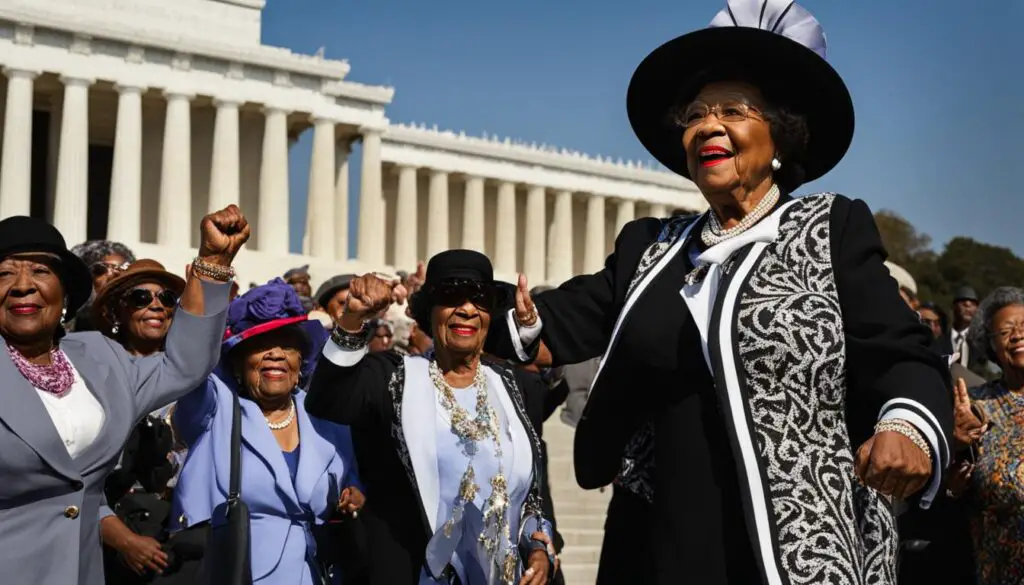
Another significant collaboration in Dorothy Height’s life was with Bayard Rustin, an influential civil rights activist and organizer. Height and Rustin both shared a commitment to nonviolent activism and worked closely together on various initiatives. One of their most notable endeavors was their involvement in the planning and execution of the historic March on Washington for Jobs and Freedom in 1963. The march, led by Dr. Martin Luther King Jr., aimed to demand civil and economic rights for African Americans.
“We must work together, helping each other in our common struggle for justice and equality.” – Dorothy Height
Despite facing sexism and limited recognition for her contributions, Dorothy Height remained steadfast in her pursuit of social justice and equality. Through collaboration and building alliances, she was able to amplify her impact and make significant strides towards positive change. Height’s dedication to working collectively and her ability to forge connections with influential figures like Eleanor Roosevelt and Bayard Rustin exemplify the power of collaboration in advancing social causes.
Dorothy Height’s Core Values and Principles
Dorothy Height’s tireless dedication to social justice, equality, empowerment, and leadership defined her impactful career. Rooted in her experiences as an African American woman, Height championed the rights of marginalized communities and fought for a more inclusive society. Her core values guided her activism and shaped her approach to advancing civil and women’s rights.
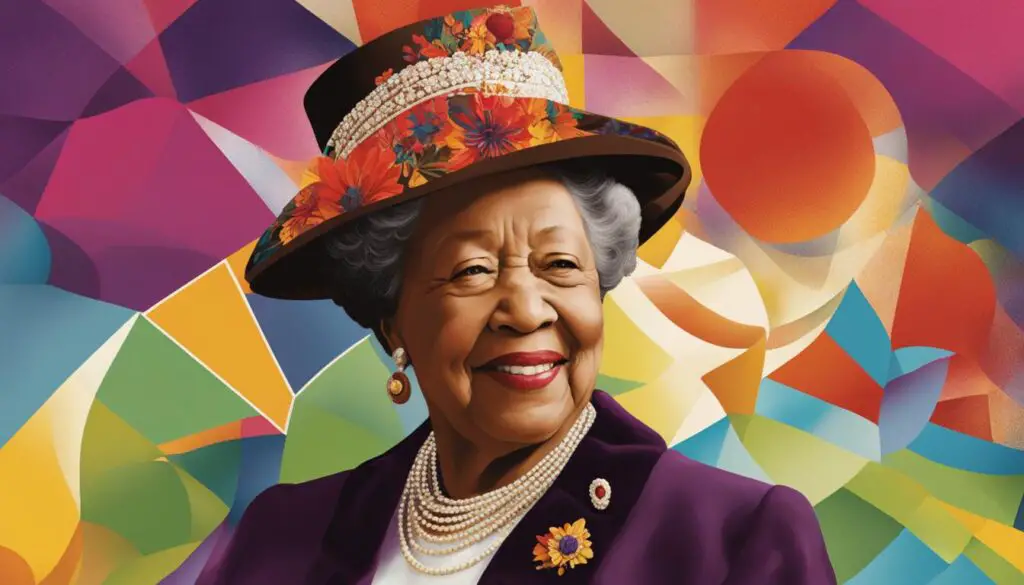
Height believed in the inherent worth and equality of all individuals, regardless of race, gender, or background. She recognized the interconnectedness of various forms of oppression and emphasized the importance of intersectionality in addressing social injustices. Her work was driven by a profound commitment to uplifting others and amplifying marginalized voices.
Height’s leadership style reflected her belief in the power of collective action. She tirelessly collaborated with other activists, forming alliances and building bridges to forge a unified front against discrimination. Height understood that progress could only be achieved through collaboration and unity, inspiring others to join her in the pursuit of justice and equality.
Height’s legacy as a transformative leader continues to inspire future generations. Her unwavering commitment to social justice and equality serves as a powerful reminder of the ongoing struggles for a fair and inclusive society. Height’s core values of empowerment, leadership, and equality remain relevant today, urging us all to carry forward her vision and work towards a more just and equitable world.
Legacy and Recognition
Dorothy Height’s legacy as a civil rights icon and women’s leader lives on, inspiring generations to come. Her tireless efforts and remarkable achievements have garnered widespread recognition and numerous prestigious awards, cementing her place in history.
One of the highest honors bestowed upon Height was the Presidential Medal of Freedom, which she received in 1994. This prestigious award recognized her lifetime of activism and dedication to social justice and equality. Height’s unwavering commitment to uplifting marginalized communities and creating a more just society earned her this esteemed accolade.
In addition to the Presidential Medal of Freedom, Height was also granted the Congressional Gold Medal, another significant recognition of her extraordinary contributions. This esteemed award, presented by the United States Congress, symbolizes the nation’s highest expression of appreciation for distinguished achievements and service. Height’s tireless advocacy for civil rights and women’s rights made a lasting impact on American society, and this prestigious award is a testament to her indelible legacy.
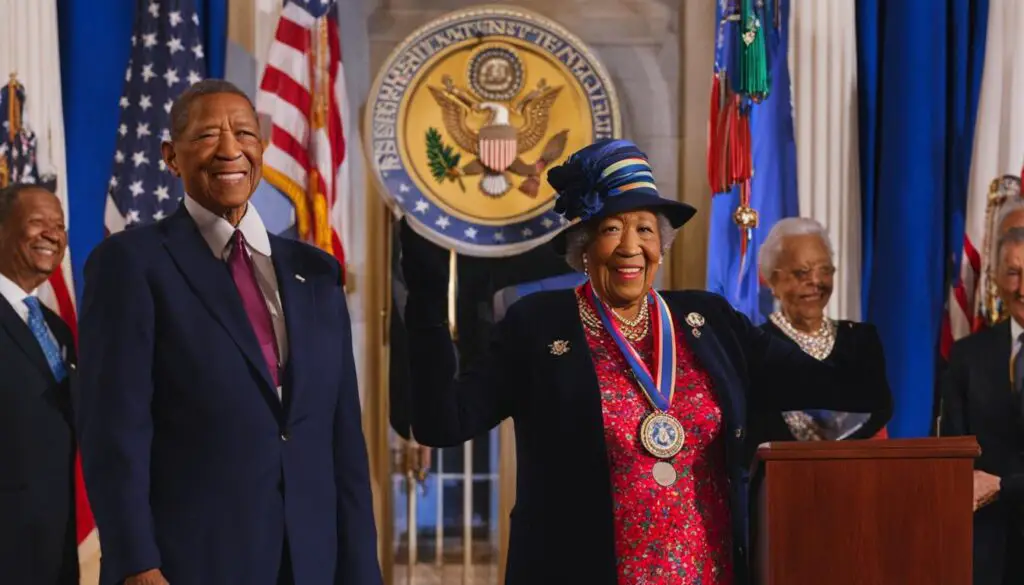
Inspiration, Leadership, and Activism: Lessons from Dorothy Height
When it comes to inspiring figures in the fight for equality and social justice, Dorothy Height’s name must never be forgotten. Her unwavering dedication and exceptional leadership in the civil rights and women’s rights movements continue to inspire and guide us today.
Height’s inspiration stemmed from her personal experiences as an African American woman, witnessing firsthand the struggles faced by her community. Recognizing the need for change, she fearlessly stepped forward, becoming a prominent voice and advocate for equality. Through her work with organizations such as the National Council of Negro Women, Height championed the rights of African American women, working to address issues of unemployment, illiteracy, and voter awareness.
“Without community service, we would not have a strong quality of life. It’s important to the person who serves as well as the recipient. It’s the way in which we ourselves grow and develop.” – Dorothy Height
Height’s leadership and activism were not without their challenges. She faced sexism and limited recognition for her contributions, but she refused to be silenced. Height built alliances with influential figures like Eleanor Roosevelt and Bayard Rustin, proving that collaboration and unity were essential in effecting meaningful change. Her role in organizing the historic March on Washington for Jobs and Freedom showcased her exceptional organizational skills and determination.
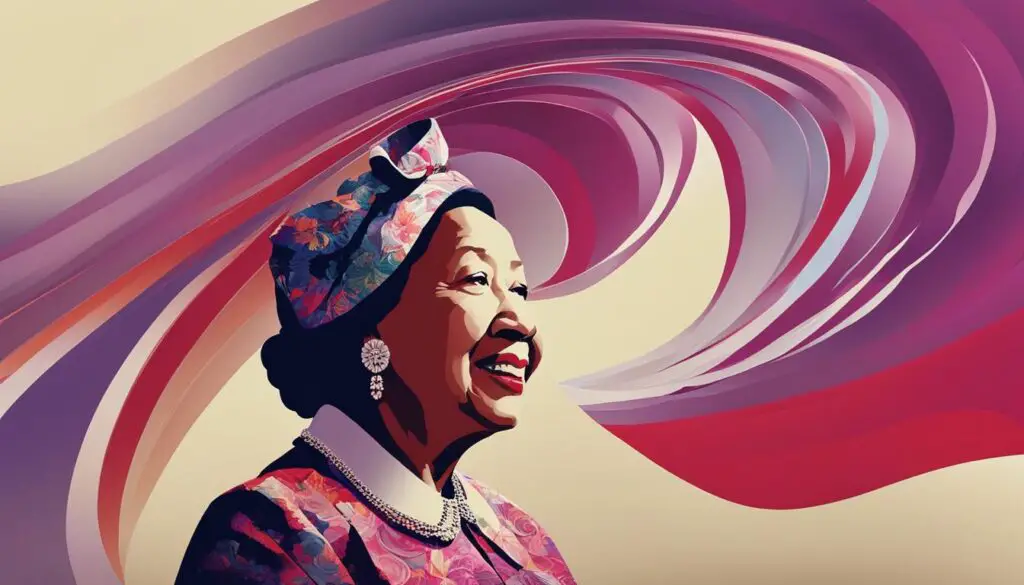
Throughout her life, Height remained dedicated to her core values and principles of social justice, equality, and empowerment. By focusing on the specific challenges faced by African American women and emphasizing intersectionality, she laid the foundation for a more inclusive society. Height’s legacy reminds us of the ongoing work needed to create a world where equality and justice prevail. Her example serves as a powerful reminder that anyone, regardless of their background or circumstances, has the ability to make a difference through their actions and leadership.
As we look to the future, let us draw inspiration from Dorothy Height’s remarkable example. Let us continue to fight for equality, advocate for social justice, and work tirelessly to build a more inclusive and equitable society for all.
Celebrating Dorothy Height’s Legacy
Dorothy Height’s contributions to African-American history and her pioneering spirit make her a trailblazer worth commemorating during Black History Month. Her unwavering dedication to civil rights and women’s empowerment continues to inspire generations to stand up for justice and equality.
Height’s tireless advocacy and leadership paved the way for significant societal change. She demonstrated the power of courage and resilience in overcoming challenges, fighting against sexism, and breaking down barriers to create a more inclusive society.
“If the time is not ripe, we have to ripen the time.” – Dorothy Height
Height’s impact extended beyond her time as the president of the National Council of Negro Women for 40 years. She played a crucial role in promoting racial integration, collaborating with influential figures such as Eleanor Roosevelt and Bayard Rustin. Height’s belief in the power of unity brought together women from different backgrounds through initiatives like Wednesdays in Mississippi, fostering understanding and challenging segregation.
By celebrating Dorothy Height’s legacy, we honor her indomitable spirit and commitment to social justice. Her activism, advocacy, and dedication to equality act as a guiding light to continue the fight for a more just and equitable world for all.
Continuing the Fight for Equality
The legacy of Dorothy Height serves as a powerful reminder of the ongoing work needed to achieve social justice and equality. Inspired by Height’s tireless activism and advocacy, individuals and organizations continue to make progress in the fight for a more inclusive and just society. As we reflect on Height’s contributions, it is clear that the journey towards equality is still ongoing, and there is much work to be done. Height’s example pushes us to remain steadfast in our commitment to activism and to continue fighting for the rights of marginalized communities.
Height’s work emphasized the importance of collective action and collaboration. It is through coming together and mobilizing as a united front that real change is possible. As we confront the challenges of our time, we must draw inspiration from Height’s determination and perseverance. Her example teaches us that progress is achieved through sustained effort and unwavering dedication. We must not shy away from speaking out against injustice, advocating for those who are marginalized, and working towards dismantling systemic oppression in all its forms.
The fight for equality requires ongoing advocacy. It is not enough to simply acknowledge the existence of social injustices; we must actively work towards dismantling them. Height’s example reminds us that advocacy is about more than raising awareness; it involves taking concrete actions to address the root causes of inequality. We must engage with policymakers, support organizations dedicated to social justice, and use our voices to effect meaningful change. By continuing the work that Dorothy Height started, we can contribute to a society where all individuals, regardless of their race, gender, or background, can thrive and succeed.
In our pursuit of progress, we must remember to celebrate the achievements and milestones along the way. Dorothy Height’s legacy inspires us to acknowledge and honor those who have worked tirelessly for social justice and equality. By recognizing and celebrating the progress we have made, we can draw strength and inspiration to keep pushing forward. Height’s impact on society is a testament to the power of advocacy and serves as a reminder that every individual has the power to make a difference. Let us honor her legacy by continuing the fight for equality, working towards a future where social justice is a reality for all.
Key Takeaways:
- Height’s legacy reminds us of the ongoing need for activism, advocacy, and collective action to achieve social justice and equality.
- We must draw inspiration from Height’s determination and perseverance, working together to confront challenges and make lasting change.
- Advocacy requires more than awareness-raising; it involves taking concrete actions to address the root causes of inequality.
- Celebrating achievements along the way strengthens our commitment to the fight for equality and inspires continued progress.
Dorothy Height’s Impact on Society
| Area of Impact | Description |
|---|---|
| Advocacy for African American Women | Height fought for the rights and recognition of African American women, addressing issues such as unemployment, illiteracy, and voter awareness. |
| Intersectionality within the Civil Rights Movement | Height highlighted the intersectionality of gender and racial inequalities, emphasizing the need for inclusivity within the broader civil rights movement. |
| Leadership in Women’s Organizations | As president of the National Council of Negro Women, Height championed women’s rights and played a crucial role in promoting equality and empowerment. |
| Building Alliances and Collaboration | Height formed alliances with influential figures such as Eleanor Roosevelt and Bayard Rustin, working together to advance the cause of social justice. |
Conclusion
Dorothy Height’s extraordinary journey as a civil rights activist and women’s rights champion has left an indelible mark on society. Her unwavering dedication to addressing the challenges faced by African American women, her commitment to intersectionality, and her tireless efforts in building alliances and advocating for change have shaped a legacy of social justice and equality.
Inspired by her own experiences as an African American woman, Height tirelessly fought for equal rights and opportunities for all. She fearlessly challenged societal norms and worked tirelessly to dismantle systemic barriers that perpetuated discrimination and inequality. Her pioneering efforts have paved the way for generations to come, empowering women and advocating for their rightful place in society.
Height’s impact extended far beyond the civil rights movement. Her leadership and influence played a significant role in shaping policies that addressed key issues such as gender-based discrimination, voting rights, and economic empowerment. Through organizations like the National Council of Negro Women, she worked tirelessly to uplift and empower marginalized communities, leaving a lasting impact on the pursuit of social justice.
While Height’s work has made significant strides toward a more just and equitable world, her legacy serves as a reminder that the struggle for equality is ongoing. Her example inspires us to continue pushing for change, challenging societal norms, and fighting against all forms of discrimination. In embracing her core values of social justice, equality, and empowerment, we can honor her legacy by actively working to create a more inclusive and just society for all.
FAQ
Who was Dorothy Height?
Dorothy Height was a prominent civil rights activist and women’s rights advocate. She was born on March 24, 1912, in Richmond, Virginia, and dedicated her life to addressing the challenges faced by African American women and promoting social justice and equality.
What organizations did Dorothy Height work with?
Dorothy Height worked with various organizations throughout her career, including the YWCA and the National Council of Negro Women (NCNW). She played a crucial role in advancing racial integration within the YWCA and served as the president of NCNW for an impressive 40 years.
What was Dorothy Height’s impact on the civil rights movement?
Dorothy Height was a key figure in the civil rights movement and was considered a member of the “Big Six” alongside influential leaders such as Martin Luther King Jr. and Roy Wilkins. She organized initiatives such as Wednesdays in Mississippi, which brought women from different racial backgrounds together to combat segregation.
What leadership positions did Dorothy Height hold?
Dorothy Height served as the president of the National Council of Negro Women for 40 years and was also the national president of Delta Sigma Theta Sorority, Inc. from 1947 to 1956. Her leadership roles in these organizations allowed her to contribute significantly to the advancement of civil and women’s rights.
How did Dorothy Height overcome challenges and build alliances?
Despite facing obstacles and limited recognition, Dorothy Height built alliances with influential figures such as Eleanor Roosevelt and Bayard Rustin. She played a crucial role in organizing the historic March on Washington for Jobs and Freedom, symbolizing the significance of women’s contributions to the civil rights movement.
What were Dorothy Height’s core values and principles?
Dorothy Height’s core values and principles were grounded in the pursuit of social justice, equality, and empowerment for all. She emphasized the power of collective leadership and worked towards creating a more inclusive and equitable society.
How is Dorothy Height’s legacy recognized?
Dorothy Height’s contributions and achievements have been widely recognized and celebrated. She received numerous awards throughout her life, including the Presidential Medal of Freedom in 1994. In 2017, she was honored with a United States Postage Stamp.
What lessons can we learn from Dorothy Height’s example?
Dorothy Height’s unwavering commitment to social justice, her inclusive leadership style, and her ability to overcome obstacles serve as a powerful example for aspiring activists and leaders. Her emphasis on collaboration, equality, and empowerment can guide individuals in their own journeys towards creating a more just and equitable society.
How is Dorothy Height celebrated during Black History Month?
Dorothy Height’s legacy is an integral part of African-American history, and during Black History Month, she is honored as a trailblazer. Her contributions during the civil rights movement and her tireless efforts in advancing women’s rights are recognized and commemorated.
How can we continue the fight for equality inspired by Dorothy Height?
Dorothy Height’s work laid a foundation for progress, but the fight for equality and social justice continues. Inspired by her legacy, individuals and organizations can continue the work she started by remaining committed to activism, advocacy, and collective action.
What is Dorothy Height’s lasting legacy?
Dorothy Height’s remarkable journey as a civil rights activist and women’s rights champion leaves behind a lasting legacy of social justice and equality. Her dedication to addressing the challenges faced by African American women and her tireless efforts in building alliances and advocating for change have had a profound impact on society.


Thank you for your sharing. I am worried that I lack creative ideas. It is your article that makes me full of hope. Thank you. But, I have a question, can you help me?